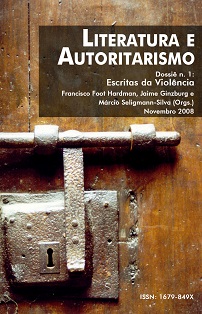The narrator of Em câmara lenta, by Renato Tapajós
DOI:
https://doi.org/10.5902/1679849X74312Keywords:
Authoritarianism, Torture, Narrator, NarrativeAbstract
This paper seeks to analyze the novel Em Câmara Lenta, written by Renato Tapajós in 1977, focusing on formal aspects of the text. More specifically, our interest lies in how the narrator is constructed and presented by the author, with the ultimate aim of establishing links between the form Tapajós elected and the social-political moment the country was going through at the time, as circunscribed in the book (between 1968 and 1973). As we look at the text vis-à-vis the context, we will try to reveal literary qualities that would allow Em Câmara Lenta to stand out in the wide spectrum of the so-called “engaged” novels – written in the wake of the 1964 Revolution and throughout the two decades that followed, and that resorted to various aesthetic options to depict the repressive conditions which characterized that period. The “road to literary value” which we expect Em Câmara Lenta to cover cannot be limited to this single paper; the contribution presented here, if any, is therefore to be seen as a first step in that direction.
Downloads
References
ADORNO, Theodor W. Crítica cultural e sociedade. In: _____. Prismas. São Paulo: Editora Ática, 2001.
ADORNO, Theodor W. O Ensaio como forma. In: _____. Notas de Literatura I. São Paulo: Duas Cidades; Editora 34, 2003.
ADORNO, Theodor W. Palestra sobre lírica e sociedade. In: _____. Notas de Literatura I. São Paulo: Duas Cidades; Editora 34, 2003.
ADORNO, Theodor W. Posição do narrador no romance contemporâneo. In: _____. Notas de Literatura I. São Paulo: Duas Cidades; Editora 34, 2003. (Espírito crítico).
ADORNO, Theodor W. Aesthetic Theory. University of Minnesota Press, 1998.
AVELAR, Idelber. Alegorias da derrota: a ficção pós-ditatorial e o trabalho de luto na América Latina. Belo Horizonte, UFMG, 2003.
BENJAMIN, Walter. Magia e técnica, arte e política: ensaios sobre literatura e história da cultura. São Paulo: Brasiliense, 1996. (Obras Escolhidas, v. I)
BENJAMIN, Walter. Origem do drama barroco alemão. São Paulo: Brasiliense, 1984.
DALCASTAGNÈ, Regina. O espaço da dor. Brasília: Editora UnB, 1996.
DALCASTAGNÈ, Regina. Entre fronteiras e cercado de armadilhas. Brasília: Editora UnB, 2005.
FAUSTO, Boris. O pensamento nacional autoritário. Rio de Janeiro: Jorge Zahar, 2001.
FREUD, Sigmund. Luto e melancolia. Novos Estudos Cebrap, n. 32, mar/1992.
GINZBURG, Jaime. Imagens da tortura: ficção e autoritarismo em Renato Tapajós. In: KEIL, Ivete; TIBURI, Márcia (orgs.). O corpo torturado. São Paulo: Escritos, 2004.
HOBSBAWM, Eric. Era dos extremos. São Paulo: Companhia das Letras, 1995.
JOSÉ, Emiliano. Galeria F – lembranças do mar cinzento. São Paulo: Casa Amarela, 2005.
NUNES, Benedito. Do tempo real ao tempo imaginário. In: _____. O tempo na narrativa. São Paulo: Ática, 2003.
NUNES, Benedito. Os tempos da narrativa. In: _____. O tempo na narrativa. São Paulo: Ática, 2003.
RIBEIRO, Renato Janine. A dor e a injustiça. In: COSTA, Jurandir Freire. Razões públicas, emoções privadas. Rio de Janeiro: Rocco, 1999.
SCHWARTZMAN, Simon. Bases do autoritarismo brasileiro. Rio de Janeiro: Campus, 1988.
TAPAJÓS, Renato. Em câmara lenta. São Paulo: Alfa-Ômega, 1977.
TAPAJÓS, Renato. Introdução. In: _____. Em câmara lenta. São Paulo: Alfa-Ômega, 1977.
VÁRIOS. Brasil nunca mais. Petrópolis, Vozes, 1996.
WATT, Ian. A ascensão do romance. São Paulo: Companhia das Letras, 1990.
Downloads
Published
How to Cite
Issue
Section
License
DECLARAÇÃO DE ORIGINALIDADE E EXCLUSIVIDADE E CESSÃO DE DIREITOS AUTORAIS
Declaro que o presente artigo é original e não foi submetido à publicação em qualquer outro periódico nacional ou internacional, quer seja em parte ou na íntegra. Declaro, ainda, que após publicado pela Literatura e Autoritarismo, ele jamais será submetido a outro periódico. Também tenho ciência que a submissão dos originais à Literatura e Autoritarismo implica transferência dos direitos autorais da publicação digital. A não observância desse compromisso submeterá o infrator a sanções e penas previstas na Lei de Proteção de Direitos Autorais (nº 9610, de 19/02/98).






